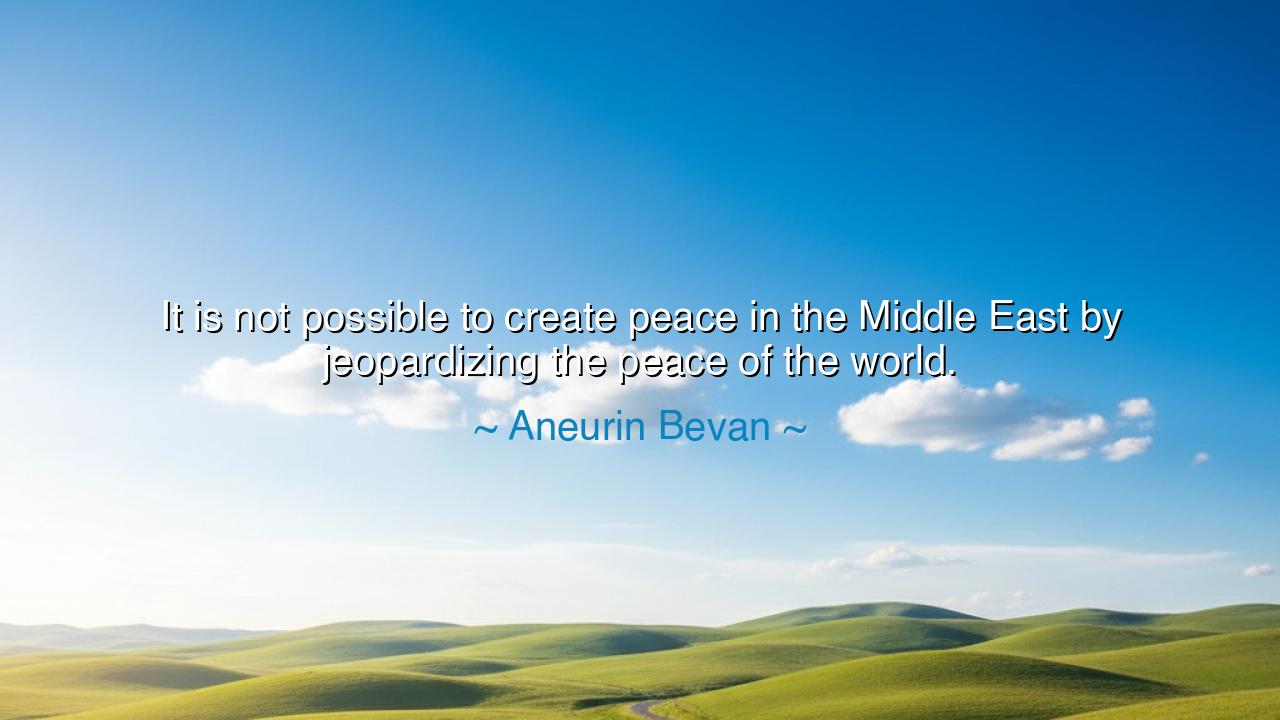
It is not possible to create peace in the Middle East by
It is not possible to create peace in the Middle East by jeopardizing the peace of the world.






Hear now the voice of Aneurin Bevan, a statesman whose words were not cast lightly, but forged in the fires of conflict and the shadow of global unrest. He declared with clarity and gravity: “It is not possible to create peace in the Middle East by jeopardizing the peace of the world.” This statement is no passing observation but a profound warning, one born of the bitter lessons of war and the fragile struggle for diplomacy. In it, he reminds all who would lead: peace cannot be built in one corner of the earth by endangering the whole. To do so is not peace but imbalance, not reconciliation but peril.
What is the meaning of this wisdom? The Middle East, a land ancient with history, sacred to many faiths, and rich in resources, has long been a focal point of conflict. Nations, empires, and powers have sought to impose order there—sometimes for justice, often for their own gain. Yet Bevan saw the danger of sacrificing the wider peace of the world for the sake of a narrow or short-term solution. To bring calm to one region by igniting chaos elsewhere is not true statesmanship, but folly. True peace must be universal in spirit, not bought with the suffering of distant peoples.
Consider the fate of the Great Powers in the early twentieth century. In seeking to control territories and resources of the Middle East after the fall of the Ottoman Empire, they carved borders with little regard for peoples or cultures. For a time, they proclaimed stability. But their choices bred resentment, division, and wars that echoed for generations. Worse still, their rivalries and bargains contributed to mistrust that spread across the globe, weakening the fragile order of peace after the First World War and feeding the fire that became the Second. Bevan’s words resonate here: one cannot achieve peace in a single region if the cost is the harmony of the earth entire.
History also remembers the Cold War, when great powers sought influence in the Middle East, sometimes arming allies, sometimes fueling proxy wars. Leaders justified these actions as preserving peace in the region or maintaining stability. Yet often these choices brought the world closer to wider confrontation—superpowers clashing not directly, but through smaller nations, their peace endangered for the illusion of control. Again, Bevan’s wisdom proves timeless: the peace of one land cannot rest on the jeopardy of all mankind.
O children of tomorrow, take this truth into your hearts: peace is indivisible. To shatter it in one place is to weaken it everywhere. To seek peace for one people while sowing violence upon another is to plant seeds of endless war. Bevan’s words shine like a lamp against the temptation of narrow victories and shortsighted deals. They call us to remember that humanity is one body, and what wounds the limb also endangers the whole.
The lesson is luminous: leaders must never trade the global peace for the false peace of one region. For true peace is not bargaining chips upon a board—it is the shared breath of nations, the common trust that war shall not devour. Peace that is bought at the expense of others is not peace at all, but a fragile truce, doomed to crumble under the weight of injustice.
Practical action lies here: in your life, do not seek harmony with one person by stirring conflict with another. In your community, do not build unity by excluding or oppressing. And in the world, demand of your leaders that their policies honor not only local or national peace, but the broader fabric of humanity. Let your choices, great or small, reflect the truth that peace cannot be divided—it must be whole, or it is nothing.
So let the words of Aneurin Bevan echo across the ages: “It is not possible to create peace in the Middle East by jeopardizing the peace of the world.” Take them as a charge, that you may weigh every action, every alliance, every treaty not by what it wins today, but by what it means for tomorrow. For peace is one garment woven across nations—tear it in one place, and the whole is undone. Guard it, nurture it, and extend it to all, that it may endure.






AAdministratorAdministrator
Welcome, honored guests. Please leave a comment, we will respond soon